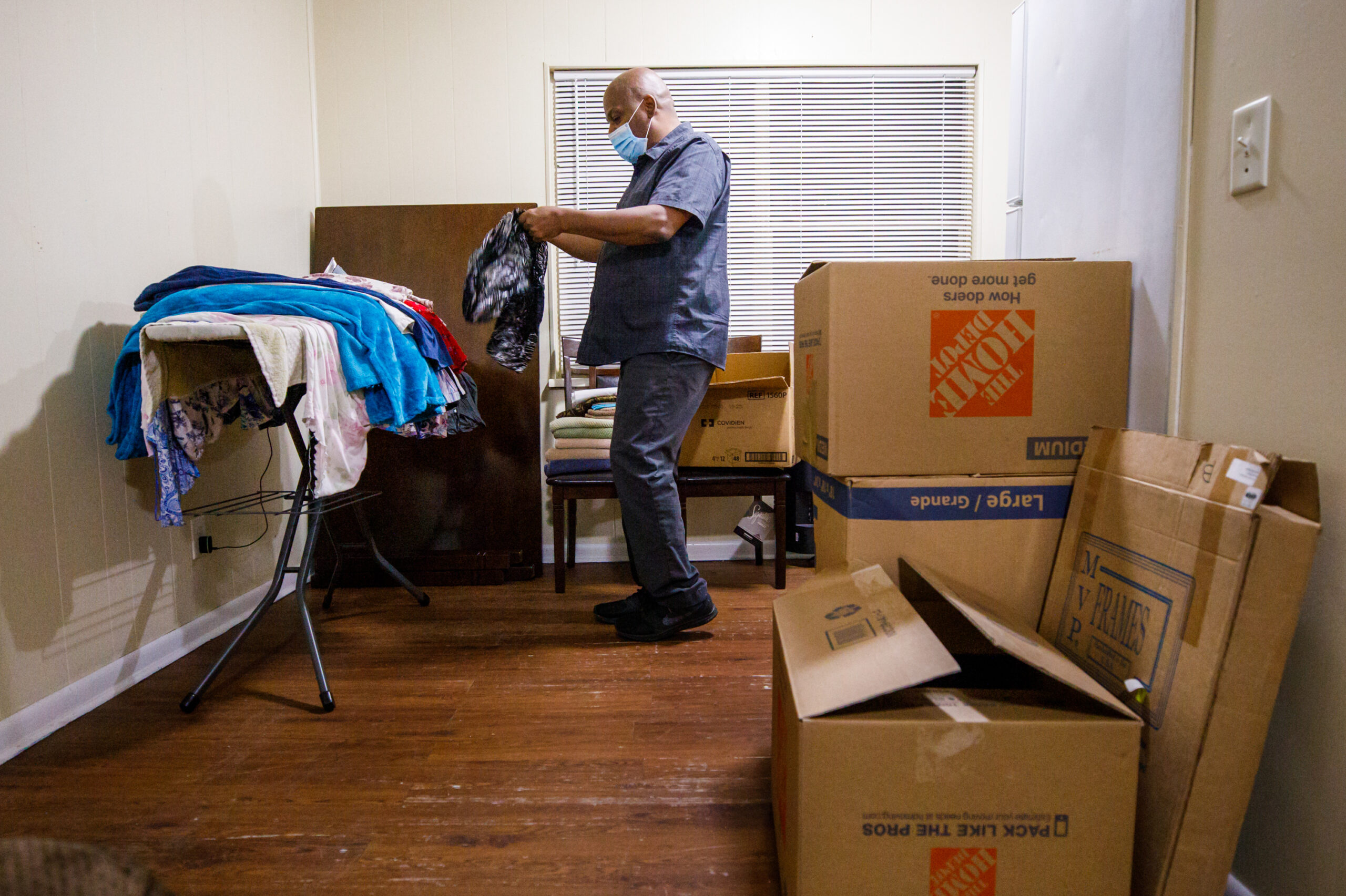Evicted And Homeless Due To Pandemic — ‘I Literally Had To Sleep In My Car’

Gregory Curry has had almost all his belongings in boxes and in a storage locker since he was evicted in August. He spent more than seven months struggling to survive financially and unable to find another landlord willing to rent to him.
Colin Hackley for NPR
Getting evicted can hurt you in a bunch of different ways. You don’t have to tell that to 57-year-old Gregory Curry in Dothan, Ala.
“I’ll be honest with you, I was petrified by this situation,” Curry says. “What I’ve had to go through over this last year.”
Curry fell behind on rent after the furniture store where he was a salesman shut down due to COVID-19. His landlord filed an eviction case against him over the summer.
Curry had nowhere to go. But there was no federal eviction moratorium in place at the time and the judge ordered him to leave. “They told me I had to be out,” Curry says.
Curry’s story is a window into what potentially millions more Americans may have to face if they can’t catch up on back rent by the end of June — when the latest extension of a moratorium from the Centers for Disease Control and Prevention expires.
Curry says he’d never been evicted before. He didn’t really know what to do next. “Now, mind you, I had five rooms of furniture because I had an upstairs downstairs duplex,” he says.
Curry got a storage unit. And he had a friend with a truck come help him the day he had to leave.
But while they moved a load of his furniture to storage, Curry says the landlord quickly changed the locks and just tossed the rest of his things outside.
“They had come in there and threw them out on the road,” Curry says. “I was devastated, and the neighbors were literally coming by and taking my things.”
Curry’s landlord, a company called D. Ream Properties, did not respond to NPR’s requests for an interview.
Court records show the landlord added legal fees for the eviction and other charges on top of what he owed in rent. And when the furniture store reopened and he started working again, Curry got an unwelcome surprise.
“I’m at work,” Curry says. “In comes the sheriff. And he says, are you Gregory Curry? And I say I am.” He says the sheriff had a letter for him and the manager. “It was a garnishment,” Curry says.
Court records show a wage garnishment to take the money Curry owed the landlord in unpaid rent. Curry says his old landlord started seizing 25% of his wages.
On top of that, with an eviction on his record, Curry ran into a cold hard truth of getting evicted. When you look for a new place to live, many landlords check the court records or ask if you’ve ever been evicted.
And if they’re looking at two people, one with an eviction, and the other not, for many that makes the decision pretty easy.
So for more than seven months now, Curry hasn’t had a home. Even though he started working again and has a job. He’s stayed at long-term stay hotels, that is, when he’s had enough money to do that.
“I literally had to sleep in my car,” Curry says. He says the extended stay hotels cost more than what he was paying for rent and utilities. So his housing costs got higher, and his wages were being seized by his old landlord.
“So when you’ve maxed out what couple credit cards you’ve had and you can’t even borrow money because everything has just fallen apart at the same time,” Curry says. “I mean, the emotional toll has been more than the actual financial toll.”
Meanwhile Curry’s been driving 30 miles every other day to make sure his mom’s OK at a nursing home.
And he’s still just kind of mystified by everything that has happened. If there’s a safety net, Curry seems to have fallen through it.
“This is outrageous,” he says. “That this is going on in the United States of America.”
Rachelle Greczyn is a legal aid attorney in Alabama where Gregory Curry lives. She says she’s seen a lot of people in Curry’s situation — during the pandemic and before. You get evicted, nobody will rent you another place.
“It’s tough,” says Greczyn. “And even if we have clients where we can get the eviction dismissed or they come to some kind of a settlement agreement, the court records will show that an eviction was filed. So it shows up when future landlords are looking.”
One bill in Congress introduced this month in the House would stop credit bureaus from putting evictions during the pandemic on people’s credit reports.
Greczyn says too, when you’re stuck unable to find another home, evictions can send people into a downward spiral.
“A lot of times it snowballs,” she says. “You might have trouble with making your car payment.” She says, for example, if you’re paying more than your rent to live in a motel, that saps your resources. “Then you might have trouble keeping your car. If you end up losing your car, your job’s at risk.”
Curry feels lucky that he hasn’t lost his car. And that he hasn’t gotten COVID-19, even though evictions can raise the risk of that.
And, in just the past week or so, Curry’s luck has changed in other ways too.
After more than seven months, a family member has helped him find a landlord who will rent him a place. And a homeless assistance group is giving him first and last month’s rent so he’s been able to start moving in.
“Ach! I’m very relieved right now,” says Curry. “Cause this has been quite a road.”
Currey says he’s just grateful to be recovering from one of the hardest years of his life. “I’m a pretty strong guy, but this was a really rough situation.”
Curry was hesitant about sharing his story. But he decided he wanted to because he doesn’t think this should he happening to people in a pandemic.
9(MDAxODM0MDY4MDEyMTY4NDA3MzI3YjkzMw004))








